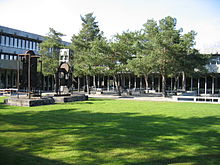Postdoctoral Researcher in anticipatory, within and across generations, stress responses
HiLIFE, Helsinki Institute of Life Science (www.helsinki.fi/hilife) , at the University of Helsinki, is one of the leading life science research institutes in the Nordics. It builds on existing strengths and new recruits and partnerships to create an attractive international environment where today’s grand challenges in health and environment are solved together.
HiLIFE supports outstanding research and generation of innovations across the University’s campuses within partner faculties and its own units, the Institute for Molecular Medicine Finland (FIMM), the Institute of Biotechnology and Neuroscience Center.
HiLIFE also coordinates research infrastructures in life sciences and provides research-based interdisciplinary training. HiLIFE has a staff of more than 650 diverse scientists and support personnel. The budget exceeds 60 M€ of which about 65% is external competed research funding.
The Helsinki Institute of Life Sciences invites applications for a
POSTDOCTORAL RESEARCHER
in an integrative project to address the role of within and across-generation plasticity in stress tolerance for a fixed term of two years. There will be a trial period of six months in the beginning.
The post doc will join the Life-history Evolution Research Group (http://www.helsinki.fi/life-history-evolution) led by Associate Professor Marjo Saastamoinen. The research group of M. Saastamoinen is also part of the Research Centre for Ecological Change (www.helsinki.fi/rec) and the Research Programme of Organismal and Evolutionary Biology at the Faculty of Biological and Environmental Sciences. Thus the post doc will thus have an opportunity to interact within the dynamic and highly international research environments at University of Helsinki.
The starting date is 1.11.2021, but a later starting date can be negotiated.
The overreaching aim of the project is to understand the role of anticipatory plastic responses to environmental stress, both within and across generations, using the Glanville fritillary butterfly as a study organism. The project builds on an on-going work (in collaboration with Dr Vicencio Oostra at University of Liverpool, UK) indicating that both individual’s own developmental conditions and those experienced by its mother shape its phenotype. Furthermore, epigenetic and transcriptomic analyses suggest that within- and transgenerational responses are mediated by distinct pathways.
We are now seeking a post doc to continue this project in order to understand the potential adaptive and anticipatory nature of stress responses and/or the impact of paternal condition in the trans-generational stress responses. The successful candidate will participate in planning and conducting experiment(s), analyse the phenotypic (and genomic transcriptomic and/or ATAC-sequencing) data, and lead the writing of the resulting manuscript(s). There is also potential for analysing part of the existing data prior obtaining own results. The successful candidate is expected to have a strong background in evolutionary ecology and experimental approaches. If interested in combining phenotypic experiments with genomic analyses, then demonstrable experience in bioinformatic analyses of genomic data are also expected.
The successful applicant should have completed a PhD in evolutionary ecology or a related field, and have strong statistical (and bioinformatics) skills. We seek candidates with excellent written and verbal communication skills, and the ability to conceive, execute and complete research projects, and to think independently and creatively. The post doc will work as a part of a team and thus good social skills are also required.
For more information, contact assoc. prof. Marjo Saastamoinen by email: marjo.saastamoinen@helsinki.fi
The salary of the successful candidate will be based on level 5 of the demands level chart for teaching and research personnel in the salary system of Finnish universities. In addition, the appointee will be paid a salary component based on personal performance. The starting salary will be ca. 3300–3800 euros/month, depending on the appointee’s qualifications and experience.
Application should include the following documents as a single pdf file: motivational letter (max 1 page), CV (max 2 pages) and publication list. Include also contact information of two persons who can provide a reference letter based on request.
Please submit your application using the University of Helsinki Recruitment System via the Apply link. Applicants who are employees of the University of Helsinki are requested to leave their application via the SAP HR portal. The deadline for submitting the application is 20 August 2021.
In case you need technical support with the recruitment system, please contact rekrytointi(at)helsinki.fi.
The University of Helsinki, founded in 1640, is one of the world’s leading universities for multidisciplinary research. The university has an international academic community of 40,000 students and staff members. The University of Helsinki offers comprehensive services to its employees, including occupational health care and health insurance, sports facilities, and opportunities for professional development. The International Staff Services office assists employees from abroad with their transition to work and life in Finland. The Faculty of Biological and Environmental Sciences is the largest research and teaching unit in biosciences in Finland and situated at the Viikki campus.
To find more about us, please visit:
https://www2.helsinki.fi/en/faculty-of-biological-and-environmental-scie...
https://www2.helsinki.fi/en/faculty-of-biological-and-environmental-scie...
Due date
20.08.2021 23:59 EEST




